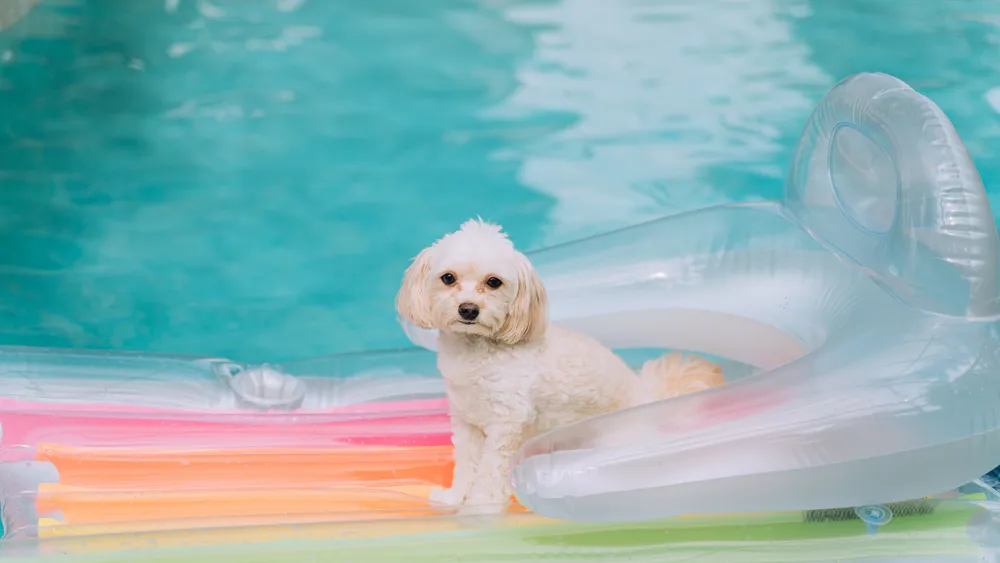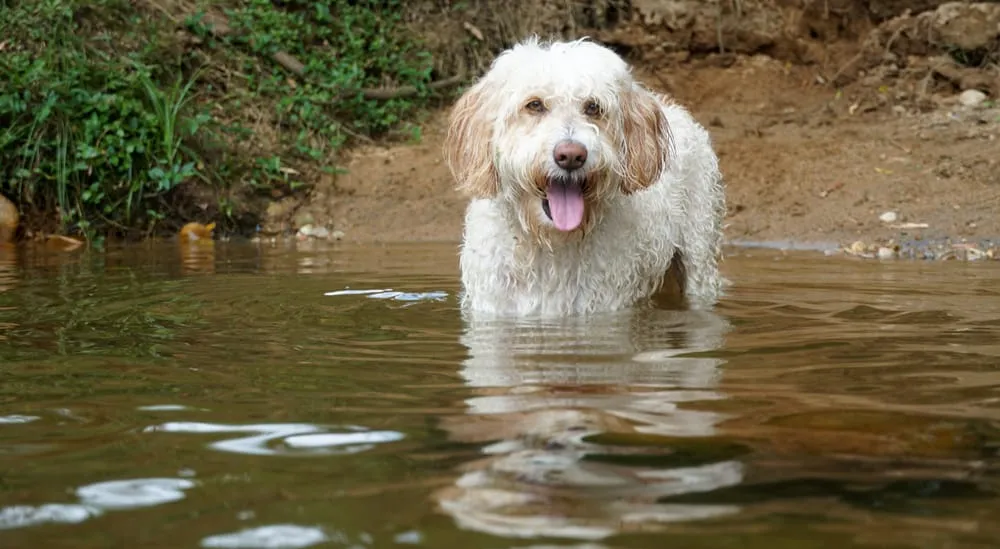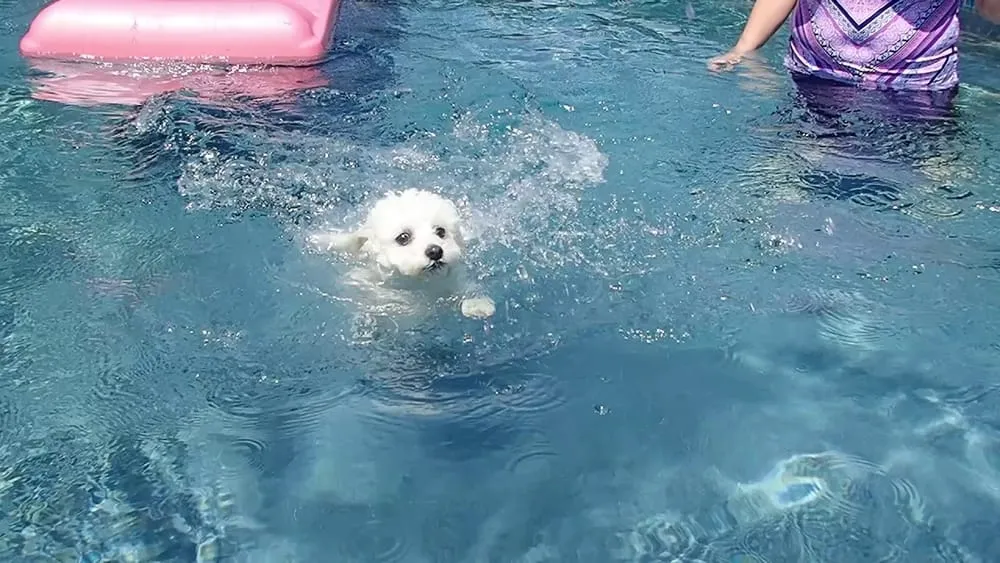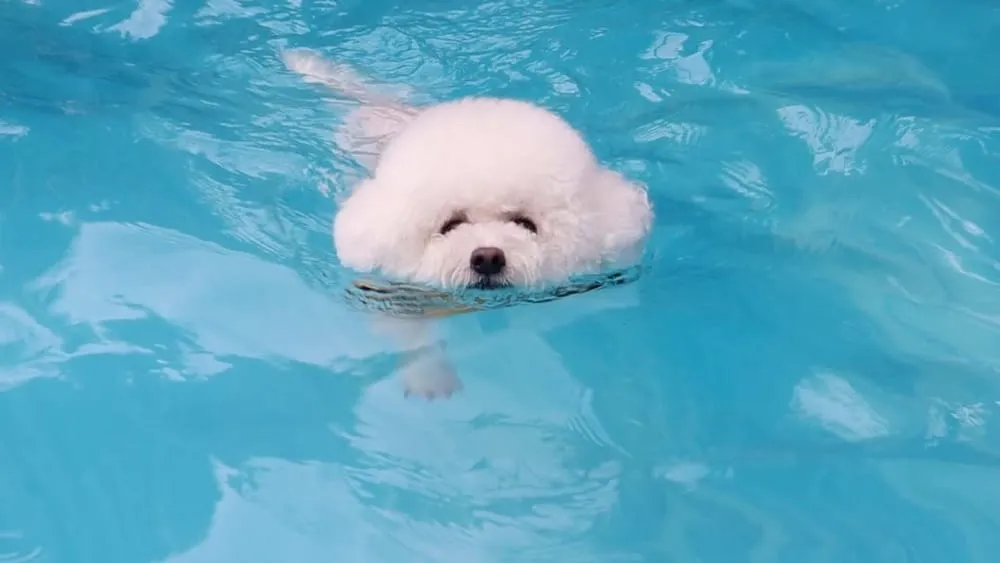Bichon Frise is a small, fluffy dog breed that is known for its playful and affectionate nature. However, when it comes to swimming, many people wonder whether these adorable pups are able to take a dip in the water. The answer to the question "can Bichon Frise swim?" is not a straightforward one, as it depends on a few different factors.

Firstly, it's important to note that not all dogs are natural swimmers. While some breeds, such as Labrador Retrievers and Golden Retrievers, are known for their love of water and strong swimming abilities, others may struggle in the water. When it comes to Bichon Frise, they are not typically considered to be natural swimmers. However, this doesn't mean that they can't swim at all. In fact, with the right training and supervision, many Bichon Frises can learn to enjoy swimming and even become quite skilled at it.
Bichon Frise Breed Overview
Physical Characteristics
The Bichon Frise is a small breed of dog known for its fluffy white coat and playful personality. They typically weigh between 10-18 pounds and stand about 9-11 inches tall. Their coat is soft and curly, resembling that of a poodle, and requires regular grooming to prevent matting.

The breed has a round head with a short muzzle and dark, round eyes. Their ears are long and droopy, and their tail is often curled over their back. Bichon Frises have a sturdy build with short legs, making them well-suited for indoor living.
Historical Significance
The Bichon Frise is believed to have originated in the Mediterranean region and was popular among sailors and traders in the 14th century. They were often used as barter items and were highly valued for their ability to entertain and provide companionship.
The breed's name comes from the French word "bichon" which means "small dog" and "frise" which refers to their curly coat. The Bichon Frise is thought to be a descendant of the Water Spaniel and the Barbet, both of which are water dogs.
Today, the Bichon Frise is a popular companion dog known for their affectionate and playful nature. They are often used as therapy dogs due to their friendly disposition and ability to bring joy to those around them. While they may not be natural swimmers, they can be trained to enjoy the water with proper supervision.
Understanding Bichon Frises and Water
Bichon Frises are a small breed of dog known for their curly white coats and lively personalities. While they may not be the first breed that comes to mind when thinking of water activities, many Bichon Frise owners wonder if their furry friends can swim. In this section, we will explore the natural swimming abilities of Bichon Frises and unique considerations for small dogs.
Natural Swimmers
Bichon Frises are not natural swimmers, but they can learn to enjoy and excel in the water with proper training and supervision. It is important to note that not all Bichon Frises will enjoy swimming, as each dog has its own unique personality and preferences. However, many Bichon Frises have been successfully trained to swim and even participate in water sports such as dock diving.
One factor that can affect a Bichon Frise's swimming ability is their size. As a small breed, Bichon Frises may struggle to keep their heads above water and tire more quickly than larger breeds. It is important to always supervise a Bichon Frise when they are in or around water to ensure their safety.
Unique Considerations for Small Dogs
When it comes to swimming, small dogs like Bichon Frises have some unique considerations. One of these considerations is their instinct to paddle with their front legs rather than their back legs. This can make it more difficult for them to swim efficiently and tire them out more quickly.
Additionally, Bichon Frises do not have webbed feet like some breeds that are natural swimmers. This can make it more difficult for them to stay afloat and move through the water. However, with patience and practice, many Bichon Frises can overcome these challenges and enjoy swimming.
In conclusion, while Bichon Frises may not be natural swimmers, they can learn to enjoy and excel in the water with proper training and supervision. It is important to always take a Bichon Frise's size and unique considerations into account when introducing them to water activities.

Health and Safety Concerns
Importance of Supervision
While Bichon Frises have the potential to be good swimmers, it is important to supervise them while they are in the water. This is especially true if they are not experienced swimmers or if they are swimming in unfamiliar waters. Even experienced swimmers can encounter unexpected situations such as strong currents or sudden changes in water depth.
Use of Life Jackets
To ensure the safety of your Bichon Frise, it is recommended to use a life jacket. Life jackets provide buoyancy and can help your dog stay afloat in case they become tired or disoriented. A properly fitted life jacket can also help prevent injuries to joints and muscles, which can occur when dogs swim for extended periods of time.
Recognizing Signs of Fatigue
It is important to recognize signs of fatigue in your Bichon Frise while they are swimming. Signs of fatigue can include heavy panting, difficulty breathing, and a slower pace. If your dog shows any of these signs, it is important to get them out of the water and allow them to rest. Swimming for extended periods of time can put stress on a dog's heart and cause inflammation or arthritis in their joints.
Overall, Bichon Frises can be good swimmers, but it is important to take necessary precautions to ensure their safety. By supervising them, using a life jacket, and recognizing signs of fatigue, you can help prevent any potential injuries or accidents.
Training Your Bichon Frise to Swim

Bichon Frises are not natural swimmers, but with proper training, they can learn to enjoy the water and even become proficient swimmers. Here are some tips on how to train your Bichon Frise to swim.
Gradual Introduction to Water
The first step in teaching your Bichon Frise to swim is to gradually introduce them to the water. Start by letting them get comfortable with being near the water, then gradually move them closer until they are standing in shallow water. Once they are comfortable with that, you can move on to deeper water.
Positive Reinforcement Techniques
Positive reinforcement is an effective way to train your Bichon Frise to swim. Reward your dog with treats and praise when they make progress in their swimming skills. This will encourage them to continue swimming and help them associate the water with positive experiences.
Ensuring Comfort and Confidence
It is important to ensure that your Bichon Frise is comfortable and confident in the water. You can use a flotation device to help them stay afloat while they are learning to swim. Additionally, you should always keep your Bichon Frise on a leash while they are in the water to ensure their safety.
With patience and consistent training, your Bichon Frise can learn to swim and enjoy the water. Consider enrolling them in swimming lessons with a professional trainer to help them develop their swimming skills.
Benefits of Swimming for Bichon Frises
Bichon Frises are known for their playful and energetic nature. They require regular exercise to maintain their physical and mental well-being. Swimming is a low-impact exercise that can benefit Bichon Frises in many ways.
Physical Health Advantages
Swimming is an excellent exercise for Bichon Frises as it provides a full-body workout without putting stress on their joints. It helps to improve their cardiovascular health, build stamina, and increase their metabolism. Swimming can also help Bichon Frises to maintain a healthy weight and manage obesity.
Swimming is particularly beneficial for older Bichon Frises or those with joint problems. It allows them to exercise without putting excessive stress on their joints, which can cause pain and discomfort. Swimming can help to improve their circulation, which can reduce the risk of developing health problems such as arthritis.
Mental Stimulation and Well-Being
Swimming is not only beneficial for the physical health of Bichon Frises, but it also provides mental stimulation and improves their overall well-being. Swimming can help to reduce stress and anxiety, and it provides an excellent opportunity for socialization with other dogs and their owners.
Swimming can also provide a fun and engaging activity for Bichon Frises, which can help to prevent boredom and destructive behavior. It can also help to improve their confidence and provide a sense of accomplishment.
In conclusion, swimming is an excellent exercise for Bichon Frises. It provides many physical health benefits, including low-impact exercise, cardiovascular health, weight management, and improved circulation. It also provides mental stimulation and improves overall well-being. Owners should always supervise their Bichon Frises while swimming and ensure they are comfortable and safe in the water.
Practical Swimming Scenarios

Swimming as a Fun Activity
Bichon Frises love to play in the water, and swimming can be a fun activity for them. However, it is important to ensure their safety while swimming. They should always be supervised, and it is recommended that they wear a life jacket. Additionally, it is important to introduce them to water gradually, starting in shallow water and gradually moving to deeper water.
Participation in Water Games
Bichon Frises can also participate in water games such as fetch. This can be a great bonding experience between the dog and their owner. However, it is important to ensure that the dog does not become too tired or overexerted while playing in the water. It is recommended to take frequent breaks and provide plenty of water.
Bichon Frises on Boats
Bichon Frises can also enjoy sailing on boats. However, it is important to ensure that they are comfortable and safe. It is recommended to provide a non-slip surface for the dog to stand on and to secure them with a harness or life jacket. Additionally, it is important to be mindful of the dog's behavior and to ensure that they are not becoming seasick.
In conclusion, while Bichon Frises can swim and enjoy water activities, it is important to ensure their safety and comfort. Gradual introduction to water, supervision, and providing safety equipment are all important factors to consider. With proper precautions, Bichon Frises can have a great time participating in water activities.
Post-Swimming Care and Considerations
After a fun swim, it's important to take care of your Bichon Frise's coat and monitor their health. Here are some post-swimming care and considerations to keep in mind.
Drying and Coat Maintenance
Bichon Frises have a fluffy coat that can easily get wet and matted after a swim. To prevent this, it's important to dry them thoroughly. Use a towel to gently pat them down and remove excess water. You can also use a blow dryer on a low setting to dry their coat completely.
After drying, you can brush their coat to prevent matting and tangles. Use a slicker brush or comb to gently brush their fur, starting from the ends and working your way up to the roots. Regular grooming can also help maintain their fluffy coat and prevent skin irritation.
Monitoring for Health Issues
While swimming is a low-impact exercise and generally safe for Bichon Frises, it's important to monitor their health after a swim. Look out for any signs of separation anxiety, such as excessive barking or destructive behavior. If your Bichon Frise shows signs of anxiety, give them some time to calm down and offer them a treat or toy as a distraction.
It's also important to monitor their health for any signs of discomfort or injury. Check their paws for any cuts or abrasions, and watch out for any limping or stiffness. If you notice any health issues, consult with your veterinarian.
Finally, make sure to provide your Bichon Frise with safe exit points from the water. Avoid steep slopes or slippery surfaces that can cause them to slip and fall. And always supervise your Bichon Frise when they exit the water to prevent any accidents.
Following these post-swimming care and considerations can help keep your Bichon Frise healthy and happy after a swim.

Conclusion
In conclusion, the ability of a Bichon Frise to swim is influenced by various factors, including individual temperament and previous experiences. By understanding and respecting the preferences of these delightful dogs, owners can create positive water experiences that enrich the bond between them and their furry friends.
FAQs About Bichon Frise and Swimming
- Are all Bichon Frise natural swimmers?
- While some are, others may need encouragement.
- What should I do if my Bichon Frise is afraid of water?
- Gradual introduction and positive reinforcement can help overcome fear.
- Is it safe to let my Bichon Frise swim without a life jacket?
- Safety should always be a priority; a well-fitted life jacket is recommended.
- Can I teach an older Bichon Frise to swim?
- Yes, but patience and positive reinforcement are crucial.
- How often should I allow my Bichon Frise to swim?
- The frequency depends on the individual dog's preferences and health.




